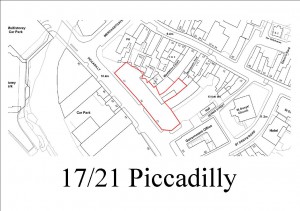The York Council is planning to sell off property and land that it owns at Lower Darnborough Street, 17/21Piccadilly, the former Manor School and adjacent to the A59 roundabout.
It also intends to purchase the remaining freehold part of Stonebow House.
The scheme on Darnborough Street, would see a vacant former malting converted into 6 town houses, the existing machinery and fittings remaining in situ in the communal area and the creation of a “renewable energy heating centre” using the existing kiln and flue to heat the townhouses which will be let on long leases. The Council have not published details of the successful bid nor have they indicated if it was the highest bid received.
The Council have negotiated with the owners of the major development site next to Manor school (ABF who own the former British Sugar assets) to sell it. It will form part of the major access to the new housing development. Again the Council have not revealed details of the negotiated price. The site was not put on the open market.
The former aircraft works and (later) tram depot on Piccadilly is – as has been widely reported – set to become a hotel. Offers, which have not been revealed, are subject to the granting of planning permission.
An area of land next to the A59/A1237 roundabout is to be sold to the adjacent garage. The Council understands that a major redevelopment will then take place.
Finally the Council intend to buy out the North Yorkshire County Council, from its 50% ownership of the Stonebow site, for £62,250.
Generally the City has always benefited in the long term from land and property acquisitions so this move may be a good one. However the controversial building is let to property holding company which is currently in receivership, so rapid progress is unlikely.
NB. The York Council has been criticised in the past for selling off assets at the wrong time and in the wrong way. The Haymarket/Hungate car park – which generates over £100,000 a year in income – was sold to an insurance company at the low point in the recession, potentially losing taxpayers over £2 million.

